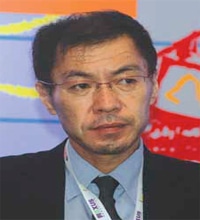
Shigeru Aoyagi,
Director and UNESCO Representative to India, Bhutan, Maldives and Sri Lanka
The issue of gender equality in education is not being adequately addressed
UNESCO is dedicated to pursuing the goal of promoting education amongst every section of the society. The organisation is as focussed in India as in other parts of the globe. In India there are as many as 300 million people who cannot read and write and yet we are discussing ICT, access to the computer, mobile phones and the high budget gadgets. For the progress of education it is important that we have a sustainable development programme, which can enable larger sections of the population to pursue quality education. The education for sustainable development will end in the year 2014 and ‘Education for all’, which is a Millennium Development Goal to be achieved by 2015. Looking at these deadlines and obligations, UNESCO has organised a very interesting regional meeting to reflect on the status of ‘Education for All’ programme.
Many reflections and deliberations were held to access the shape of education in the coming years especially by the year 2015 and further on. One of the most interesting discussions had to do with how we can utilise ICT for education. The second important discussion was on non-formalisation of formal education. India, for instance, enjoys a high enrolment ratio of 97 percent, but the retention rate is only 69 percent. This means that more than 30 percent of the enrolled kids will become drop-outs. Why? It was discussed that the quality of the teacher is the most important factor when it comes to addressing this drop-out issue and the low attendance ratio.
The universalisation of primary education in India will be completely achieved by the end of 2015. However, the issue of gender equality in education is not being adequately addressed. The education system has only 0.87 percent of girls against boys. These are major challenges that need to be addressed in order to bring about advancements in the education system in the country.
Future developments
Shri Kapil Sibal, the Honourable Minister in Indian Government, and Irina Bokova, the Director General UNESCO, have signed an agreement on 9th July 2012, to establish a new UNESCO institute in Delhi. This institute will be named Mahatma Gandhi Institute of Education for Peace and Sustainable Development. Education for peace and sustainable development will be a very critical area for education in the coming years. In Sri Lanka, a ten year National Action Plan for education for sustainable development has been launched. All these encouraging events are addressing the requirements of the future generation.
India will also organise, chair and host a meet by inviting the ministers from 9 countries to debate and reflect on what kind of tasks are required for fulfilling ‘Education for All’ goals. The theme of this ‘E9 ministerial meeting’, which will have representatives from India, Pakistan, Bangladesh, China, Brazil, Mexico, Egypt, Sri Lanka and others, is ‘Inclusive Quality Education’. Prof Mantha talked about National Qualification Framework for Vocational Training which is in line with non-formalisation of formal education system and addresses the learners’ needs in terms of place, time and pace. This flexibility will be one of the key factors that can lead to a paradigm shift in education.
Improvements in education system need not only the efforts from supplier’s side, it also needs a thorough study of the needs and demands of the market. The bottom line is that the approach which is focused on delivering learner-oriented and need based learning will give most beneficent outcomes as far as the agenda of furthering education is concerned.
























